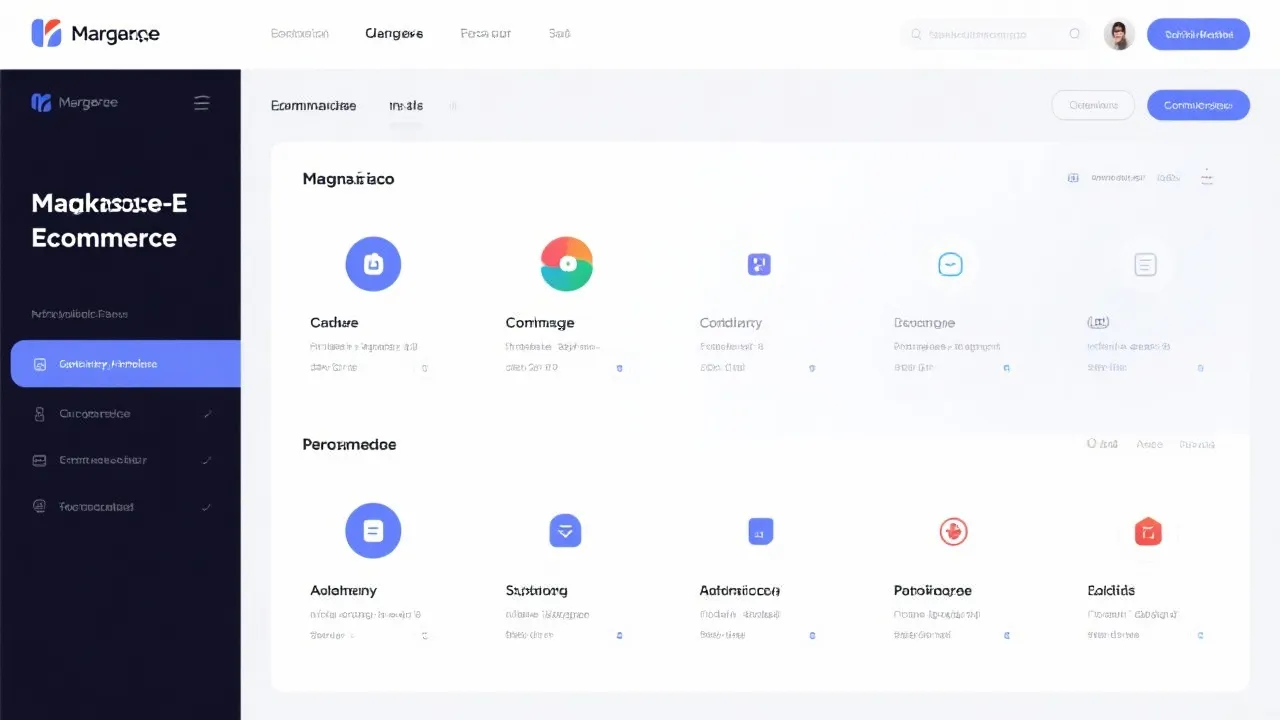Effective Strategies for Using Magento
Exploring Magento's influential presence in the eCommerce sector, this article delves into its features and adaptability. Magento offers robust tools for businesses seeking scalable online solutions, particularly noted for its flexibility in customizing online stores and robust eCommerce features. This guide looks at how to leverage Magento’s offerings effectively, providing a detailed analysis for business owners and developers.

Introduction to Magento in eCommerce
Magento, a name synonymous with flexibility and scalability in the eCommerce world, has carved a distinctive niche for itself among other platforms. Its robust framework allows merchants to customize online shops to fit specific business needs, ensuring a tailored user experience. Having launched its first version in 2008, Magento has continually evolved, adapting to the demands of the rapidly changing digital marketplace. Its versatility and wide array of features make it a premier choice for retailers wanting to stand out in a competitive landscape. From small businesses to large enterprises, Magento provides solutions that can dynamically cater to various eCommerce challenges.
The Cornerstone of Magento: Flexibility and Customization
One of the most compelling features Magento offers is its unparalleled customization capabilities. Merchants can design their stores with unique layouts and functionalities to appeal directly to their target audience. Whether it’s integrating third-party plugins or developing bespoke modules, Magento provides the necessary tools to make it possible. Businesses can modify every aspect of their store—including product pages, checkout processes, and payment systems—according to their specific business requirements. This level of flexibility not only enhances the user experience but also helps in building a solid brand identity. Developers can create custom themes that resonate with their branding, providing a cohesive visual experience across the site. Moreover, Magento’s open-source nature invites a vibrant community of developers and users to continuously innovate and share ideas, further contributing to the platform's robust customization capabilities.
Magento vs Other eCommerce Platforms
In the crowded market of eCommerce solutions, Magento stands out due to its powerful capabilities. Unlike simpler platforms, Magento offers advanced functionalities that cater to mid-to-large businesses with complex requirements:
| Platform | Features | Suitability |
|---|---|---|
| Magento | Advanced customization, extensive plugin library, multi-store management, scalable architecture | Medium to large enterprises |
| Shopify | Ease of use, all-in-one solution, limited customization, hosted platform | Small to medium businesses |
| WooCommerce | WordPress integration, flexibility for small sites, relies on WordPress hosting | Small businesses |
Magento’s feature set accommodates extensive product catalogs, multiple sales channels, and complex pricing rules, making it indispensable for larger operations that require advanced capabilities. In contrast, Shopify is designed for rapid deployment and ease of use, making it ideal for those new to eCommerce but limiting options for expansion and customization. WooCommerce serves as a powerful tool for WordPress users, allowing them to quickly turn their blogs into eCommerce stores, although it may lack the scalability that Magento offers for larger enterprises.
Leveraging Magento's Features for Success
To harness the full potential of Magento, businesses should focus on its key features:
- Scalability: Ideal for businesses anticipating growth, as Magento can effortlessly handle increased traffic and orders. Its architecture supports multiple stores across different locations and empowers businesses to manage extensive inventories without sacrificing performance.
- Mobile Optimization: With a growing number of users shopping via mobile, Magento provides responsive design and mobile-ready sites to maximize reach. Features like mobile themes and mobile-specific user experiences cater to consumers using smartphones or tablets to make purchases.
- SEO-Friendly Options: Magento is equipped with built-in SEO tools that help improve search engine rankings. Features such as sitemaps, customizable URLs, and metadata management enable merchants to effectively optimize their content and products for higher visibility.
- Robust Security: Security is paramount for eCommerce platforms, and Magento understands this critical need. With regular updates, advanced security features such as two-factor authentication, and PCI compliance, it ensures that customer data remains safe, thereby building trust.
- Integrated Analytics: Magento comes with integrated tools for analytics and reporting. Merchants can analyze shopping behavior, track sales performance, and compare metrics over time to derive insights that help in making informed business decisions.
How to Start with Magento
Launching a store with Magento requires a strategic approach. First and foremost, businesses should define their goals and target audience. Understanding the consumer base will guide the customization of the online store, from design elements to product offerings. Here are some essential steps to consider when starting with Magento:
- Choose the Right Version: Magento offers two main editions: Magento Open Source and Magento Commerce. The former is free and ideal for small to medium-sized businesses looking for a customizable platform, while the latter includes advanced features and customer support suitable for larger enterprises.
- Find a Reliable Hosting Provider: Since Magento is resource-intensive, it’s crucial to select a robust hosting provider that can ensure speed, reliability, and security for the store. Look for hosts specializing in Magento hosting to take advantage of optimized performance.
- Design Your Store: Invest time in creating an appealing design that reflects your brand and resonates with your audience. Magento allows for extensive theme customization, which can be done either through pre-built themes or bespoke designs.
- Install Necessary Extensions: There is an extensive library of Magento extensions available that can enhance functionality. From payment gateways to logistics solutions, selecting the right extensions is essential for offering a seamless customer experience.
- Optimize for SEO: As you build your store, integrate SEO best practices to improve visibility. Use relevant keywords, alt tags for images, and meta descriptions to help search engines index your store effectively.
- Test Before Launch: Before officially launching your store, conduct thorough testing across different devices and browsers to ensure a consistent user experience. Check page load times, payment process flows, and the responsiveness of design elements.
Marketing Strategies for Magento Stores
Once the Magento store is up and running, the next step involves implementing effective marketing strategies to attract and retain customers. Here are some tried-and-tested strategies that Magento retailers can leverage:
- Content Marketing: Create valuable content that resonates with your audience and showcases your expertise in your niche. Blogs, tutorials, and video content can drive traffic to your site while enhancing engagement.
- Email Marketing: Build an email subscriber list and engage customers with personalized email campaigns. Use segmentation to target specific groups with tailored messages, promotions, or product recommendations.
- Social Media Integration: Promote your Magento store on social media platforms where your target audience spends their time. Utilize platforms like Instagram, Facebook, and Pinterest to showcase products, drive traffic to your site, and build a loyal community.
- Influencer Collaborations: Partner with influencers who align with your brand. They can help promote your products to their followers, providing authenticity and extending the reach of your marketing efforts.
- Paid Advertising: Invest in paid advertising such as Google Ads or social media ads to increase visibility. Tailored campaigns can target specific demographics, driving highly relevant traffic to your Magento store.
- Customer Loyalty Programs: Implement loyalty programs that reward repeat customers. Providing discounts, exclusive deals, or points-based systems can encourage more purchases and foster long-term customer relationships.
Handling Challenges in Magento
Operating an eCommerce store on Magento comes with its own set of challenges, from technological issues to marketing hurdles. Below are some common challenges merchants may face and strategies to address them:
- Complexity of the Platform: While Magento offers extensive features, this complexity can be daunting for new users. Providing staff with adequate training and resources is crucial, as well as utilizing community forums and support documentation for troubleshooting and learning.
- Resource Management: A Magento store can require significant server resources especially during peak times. Regularly assess hosting needs based on website traffic and consider cloud hosting solutions for scalable resources that can grow with your business.
- Frequent Updates: Magento frequently releases updates for security and performance improvements. Staying current with these updates is critical; failing to do so can expose your store to vulnerabilities. Automated updates or scheduled reviews can alleviate this burden.
- Cart Abandonment: High cart abandonment rates are a common issue in eCommerce. To combat this, optimize the checkout process to make it as smooth and engaging as possible. Implement cart recovery emails to remind customers of their abandoned carts.
FAQs
- Why choose Magento for eCommerce?
It offers a unique blend of customization and scalability that caters to complex business needs. With its extensive features, businesses can create unique shopping experiences tailored to their specific goals. - Is Magento suitable for small businesses?
While it offers powerful tools, it might be more resource-intensive than necessary for a small eCommerce operation. However, small businesses aiming for growth may benefit from Magento’s capabilities. - How does Magento's cost compare?
The initial investment may be higher, but its long-term ROI often justifies the expense due to improved sales efficiency and customer satisfaction. Additionally, Magento’s openness allows for unique custom development, which can be financially advantageous over time. - What technical skills are required to manage a Magento store?
While basic user management can be performed without coding experience, having some knowledge of web development, PHP, and front-end technologies can be highly beneficial when customizing and troubleshooting the platform. - How often should I update my Magento store?
It is recommended to check for updates regularly and implement them as soon as possible to ensure your site remains secure and runs efficiently. Regular maintenance checks can help identify necessary updates.
Conclusion: Maximizing the Potential of Magento
Magento remains a dominant force in the eCommerce world due to its comprehensive suite of features aimed at providing an exceptional online shopping experience. Whether you're optimizing for mobile users or customizing every aspect of your store, Magento provides the necessary tools and support to make your online business thrive. The ability to adjust your strategies and enrich user experiences through a myriad of available functionalities is paramount in today’s competitive industry.
For businesses ready to elevate their eCommerce operations, starting with a strategic plan and understanding the full scope of Magento’s offerings can be the key to unlocking long-term success. By embedding efficient processes, leveraging advanced features, and employing effective marketing strategies, merchants can create an engaging environment that not only attracts new customers but retains existing ones.
In conclusion, harnessing the potential of Magento requires dedication to continuous improvement and adaptation to market trends. As the eCommerce landscape continues to evolve, embracing tools like Magento that offer significant flexibility and scalability will enable businesses to flourish and meet the changing demands of consumers in a digital-first world.
-

A Guide to Cost-Efficient Small Electric Cars for Seniors
-

Mastering Debt Consolidation: Boost Your Credit Score and Manage Interest Rates
-

Your Guide to Loans, Credit Checks, and Interest Rates
-

Affordable Independent Living: Finding the Right Senior Housing
-

Guide to Senior Living Apartments: Affordable and Comfortable Environments










